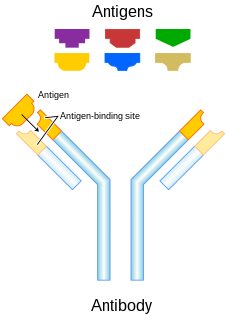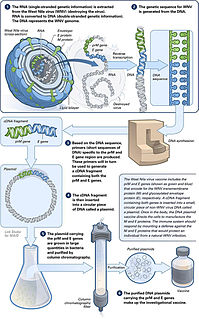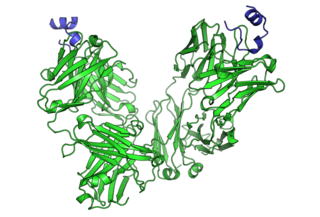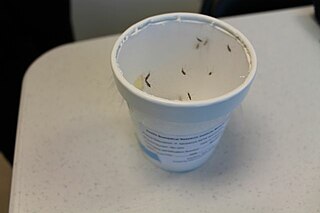Titermax is a mixture of compounds used in antibody generation and vaccination to stimulate the immune system to recognise an antigen given together with the mixture. Titermax is a developed immune adjuvant.
It is a water-in-oil emulsion and consists of squalene, an emulsifier (sorbitan monooleate 80), a patented block copolymer and microparticulate silica (Stills 2005). Toxicity seems to be lower than other water in oil adjuvant such as Freund's adjuvant. The efficacy to elicit an immune response against antigens of low immunogenicity is however subject to debate.

In immunology, an antigen (Ag) is a molecule or molecular structure or any foreign particulate matter or a pollen grain that can bind to a specific antibody or T-cell receptor. The presence of antigens in the body may trigger an immune response. The term antigen originally referred to a substance that is an antibody generator. Antigens can be proteins, peptides, polysaccharides, lipids, or nucleic acids.

A DNA vaccine is a type of vaccine that transfects a specific antigen-coding DNA sequence into the cells of an organism as a mechanism to induce an immune response.
A cancer vaccine is a vaccine that either treats existing cancer or prevents development of cancer. Vaccines that treat existing cancer are known as therapeutic cancer vaccines or tumor antigen vaccines. Some of the vaccines are "autologous", being prepared from samples taken from the patient, and are specific to that patient.
Polyclonal antibodies (pAbs) are antibodies that are secreted by different B cell lineages within the body. They are a collection of immunoglobulin molecules that react against a specific antigen, each identifying a different epitope.

Cancer immunotherapy is the stimulation of the immune system to treat cancer, improving on the immune system's natural ability to fight the disease. It is an application of the fundamental research of cancer immunology and a growing subspeciality of oncology.

The adaptive immune system, also known as the acquired immune system, is a subsystem of the immune system that is composed of specialized, systemic cells and processes that eliminate pathogens or prevent their growth. The acquired immune system is one of the two main immunity strategies found in vertebrates.
An immunogen is any substance that generates B-cell (humoral/antibody) and/or T-cell (cellular) adaptive immune responses upon exposure to a host organism. Immunogens that generate antibodies are called antigens ("antibody-generating"). Immunogens that generate antibodies are directly bound by host antibodies and lead to the selective expansion of antigen-specific B-cells. Immunogens that generate T-cells are indirectly bound by host T-cells after processing and presentation by host antigen-presenting cells.
Artificial induction of immunity is immunization achieved by human efforts in preventive healthcare, as opposed to natural immunity as produced by organisms' immune systems. It makes people immune to specific diseases by means other than waiting for them to catch the disease. The purpose is to reduce the risk of death and suffering, that is, the disease burden, even when eradication of the disease is not possible. Vaccination is the chief type of such immunization, greatly reducing the burden of vaccine-preventable diseases.
The following are notable events in the Timeline of immunology:

A virosome is a drug or vaccine delivery mechanism consisting of unilamellar phospholipid membrane vesicle incorporating virus derived proteins to allow the virosomes to fuse with target cells. Viruses are infectious agents that can replicate in their host organism, however virosomes do not replicate. The properties that virosomes share with viruses are based on their structure; virosomes are essentially safely modified viral envelopes that contain the phospholipid membrane and surface glycoproteins. As a drug or vaccine delivery mechanism they are biologically compatible with many host organisms and are also biodegradable. The use of reconstituted virally derived proteins in the formation of the virosome allows for the utilization of what would otherwise be the immunogenic properties of a live-attenuated virus, but is instead a safely killed virus. A safely killed virus can serve as a promising vector because it won't cause infection and the viral structure allows the virosome to recognize specific components of its target cells.
Agenus Inc. is a Lexington, Massachusetts-based biotechnology company focused on immunotherapy including immuno-oncology, a field that uses the immune system to control or cure cancer. The company is developing checkpoint modulators (CPMs), patient-specific anti-cancer vaccines, and adjuvants that can be used with a range of vaccines. CPM development is a particularly fast-moving field, since early products have produced unprecedented clinical benefits for patients.
Specol is a water in oil adjuvant composed of defined and purified light mineral oil. It has been suggested as an alternative to Freund's adjuvant for hyperactivation of the immune response in rabbits. Specol can be used for antigens of low immunogenicity and can be administered equally effectively by the subcutaneous or intraperitoneal routes. The histological lesions produced are fewer than those produced by using Complete Freund's adjuvant. However, pain and distress following administration of these 2 adjuvants seem to be similar.
Anti-idiotypic vaccines consist of antibodies that have three-dimensional immunogenic regions, termed idiotopes, that consist of protein sequences that bind to cell receptors. Idiotopes are aggregated into idiotypes specific to their target antigen. An example of an anti-idiotype antibody is Racotumomab.
In immunology, an adjuvant is a substance that increases or modulates the immune response to a vaccine. The word "adjuvant" comes from the Latin word adiuvare, meaning to help or aid. "An immunologic adjuvant is defined as any substance that acts to accelerate, prolong, or enhance antigen-specific immune responses when used in combination with specific vaccine antigens."

A malaria vaccine is a vaccine that is used to prevent malaria. The only approved use of a vaccine outside the EU, as of 2022, is RTS,S, known by the brand name Mosquirix. In October 2021, the WHO for the first time recommended the large-scale use of a malaria vaccine for children living in areas with moderate-to-high malaria transmission. Four injections are required for full protection.
Immune stimulating complexes (ISCOMs) are spherical open cage-like structures that are spontaneously formed when mixing together cholesterol, phospholipids and Quillaja saponins under a specific stoichiometry. The complex displays immune stimulating properties and is thus mainly used as a vaccine adjuvant in order to induce a stronger immune response and longer protection.
A subunit vaccine is a vaccine that contains purified parts of the pathogen that are antigenic, or necessary to elicit a protective immune response. A "subunit" vaccine doesn't contain the whole pathogen, unlike live attenuated or inactivated vaccine, but contains only the antigenic parts such as proteins, polysaccharides or peptides. Because the vaccine doesn't contain "live" components of the pathogen, there is no risk of introducing the disease, and is safer and more stable than vaccine containing whole pathogens. Other advantages include being well-established technology and being suitable for immunocompromised individuals. Disadvantages include being relatively complex to manufacture compared to some vaccines, possibly requiring adjuvants and booster shots, and requiring time to examine which antigenic combinations may work best.

An inactivated vaccine is a vaccine consisting of virus particles, bacteria, or other pathogens that have been grown in culture and then killed to destroy disease-producing capacity. In contrast, live vaccines use pathogens that are still alive. Pathogens for inactivated vaccines are grown under controlled conditions and are killed as a means to reduce infectivity and thus prevent infection from the vaccine.
Freund's adjuvant is a solution of antigen emulsified in mineral oil and used as an immunopotentiator (booster). The complete form, Freund's Complete Adjuvant is composed of inactivated and dried mycobacteria, whereas the incomplete form lacks the mycobacterial components. It is named after Jules T. Freund.
Immunology is the study of the immune system during health and disease. Below is a list of immunology-related articles.